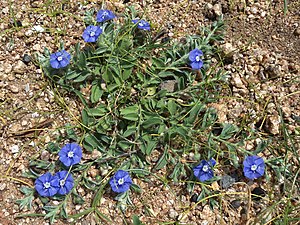Note: This is a project under development. The articles on this wiki are just being initiated and broadly incomplete. You can Help creating new pages.
Evolvulus alsinoides - Vishnukanti
Vishnukranti is a tiny prostrate spreading herb with silky hairy leaves and bright blue flowers. It can be found throughout India in gravelly and grassy places.
Contents
- 1 Uses
- 2 Parts Used
- 3 Chemical Composition
- 4 Common names
- 5 Properties
- 6 Habit
- 7 Identification
- 8 List of Ayurvedic medicine in which the herb is used
- 9 Where to get the saplings
- 10 Mode of Propagation
- 11 How to plant/cultivate
- 12 Commonly seen growing in areas
- 13 Photo Gallery
- 14 References
- 15 External Links
Uses
Insomnia, Bleeding disorders, Improves memory, Cough, Wounds, Fever, Stomach ache, Dysentery[1]
Parts Used
Chemical Composition
Common names
| Language | Common name |
|---|---|
| Kannada | Vishnukranti, Shankhapushpi |
| Hindi | Sankhpushpi, Shankaveli, Visnukranta |
| Malayalam | Krsnakranti, Vishnukranthi |
| Tamil | Paracitam, Potakiranti, Potakiranticceti, Villakkiranti, Vishnukranti |
| Telugu | Vishnukraantha, Visnukrantamu |
| Marathi | NA |
| Gujarathi | NA |
| Punjabi | NA |
| Kashmiri | NA |
| Sanskrit | Shankhapushpi, Nilapushpi, Sankhaholi, Vishnukranti |
| English | Dwarf morning glory |
Properties
Reference: Dravya - Substance, Rasa - Taste, Guna - Qualities, Veerya - Potency, Vipaka - Post-digesion effect, Karma - Pharmacological activity, Prabhava - Therepeutics.
Dravya
Rasa
Guna
Veerya
Vipaka
Karma
Prabhava
Habit
Identification
Leaf
| Kind | Shape | Feature |
|---|---|---|
| Simple | Alternate | Leaves more or less distinctly in 2 rows, 6-12 x 4-7 mm, broadly elliptic to elliptic-lanceolate, base rounded or acute, apex subacute, adpressed pilose on both sides; petiole to 2 mm long. |
Flower
| Type | Size | Color and composition | Stamen | More information |
|---|---|---|---|---|
| Bisexual | Solitary or paired at axils | Blue | 10 | Pedicels to 5 mm long, silky hairy; bracts linear, c. 1 mm long. Calyx lobes 2-3 mm long, lanceolate, silky hairy. Corolla c. Flowering from April to December |
Fruit
| Type | Size | Mass | Appearance | Seeds | More information |
|---|---|---|---|---|---|
| A capsule | 1.5-2 mm across | Globose, 2-valved | Seeds usually 4, minute. | Fruiting from April to December | {{{6}}} |
Other features
List of Ayurvedic medicine in which the herb is used
Where to get the saplings
Mode of Propagation
How to plant/cultivate
The seed have a hard seed coat, for the removal of hard seed coat; the seeds are subjected to mechanical scarification which gives 80% germination. 190 gm seeds are required for planting one hectare area. [4]
Commonly seen growing in areas
Photo Gallery
References
External Links
- Ayurvedic Herbs known to be helpful to treat Insomnia
- Ayurvedic Herbs known to be helpful to treat Bleeding disorders
- Ayurvedic Herbs known to be helpful to treat Improves memory
- Ayurvedic Herbs known to be helpful to treat Cough
- Ayurvedic Herbs known to be helpful to treat Wounds
- Ayurvedic Herbs known to be helpful to treat Fever
- Ayurvedic Herbs known to be helpful to treat Stomach ache
- Ayurvedic Herbs known to be helpful to treat Dysentery
- Herbs with Root used in medicine
- Herbs with Hole Plant used in medicine
- Herbs with common name in Kannada
- Herbs with common name in Hindi
- Herbs with common name in Malayalam
- Herbs with common name in Tamil
- Herbs with common name in Telugu
- Herbs with common name in Sanskrit
- Herbs with common name in English
- Habit - Herb
- Index of Plants which can be propagated by Seeds
- Herbs that are commonly seen in the region of Tropical area
- Herbs
- Convolvulaceae
- Ayurvedic herbs that don't have flower, fruit and leaf photos
- Ayurvedic herbs that don't have seed photos





